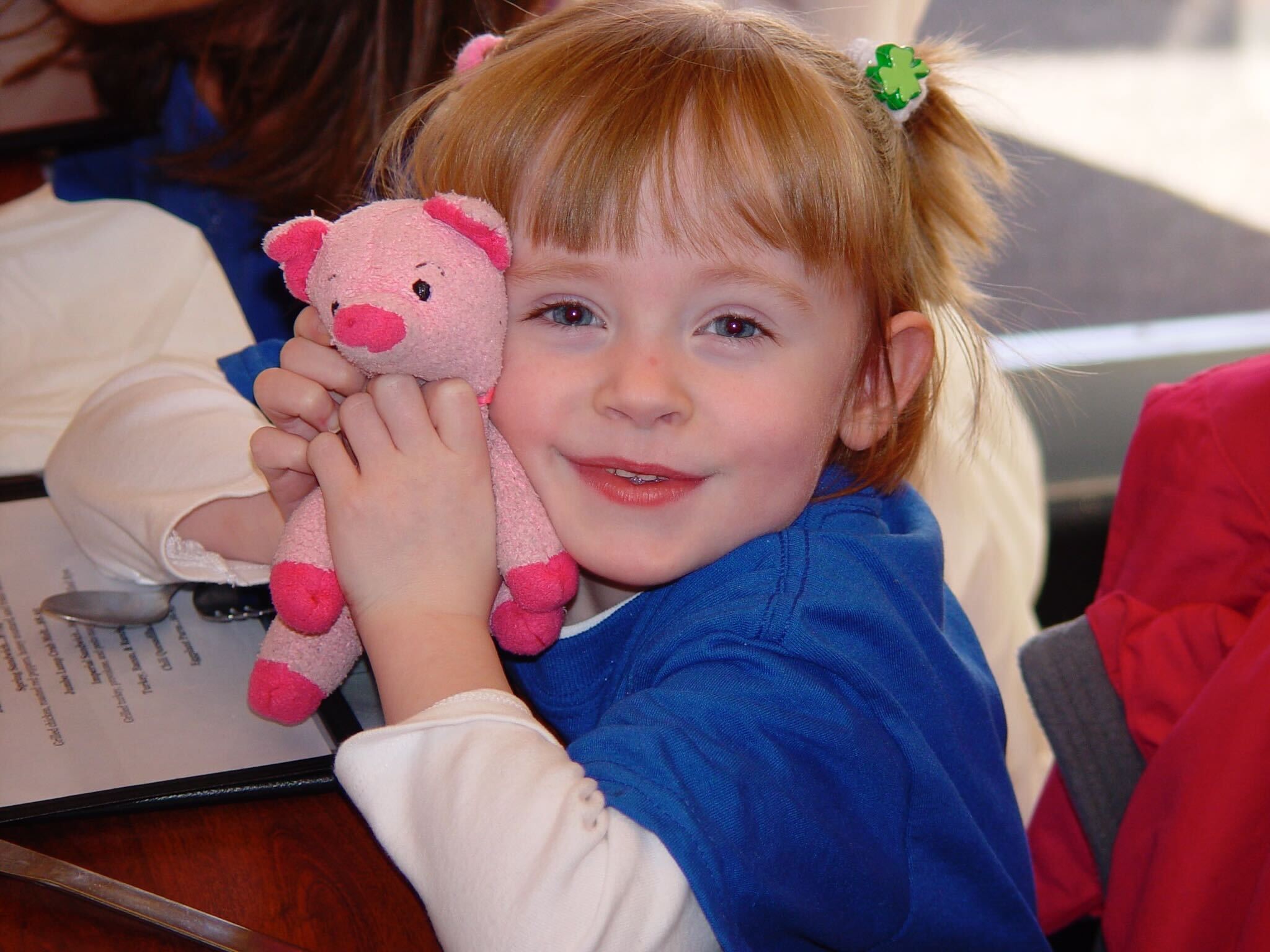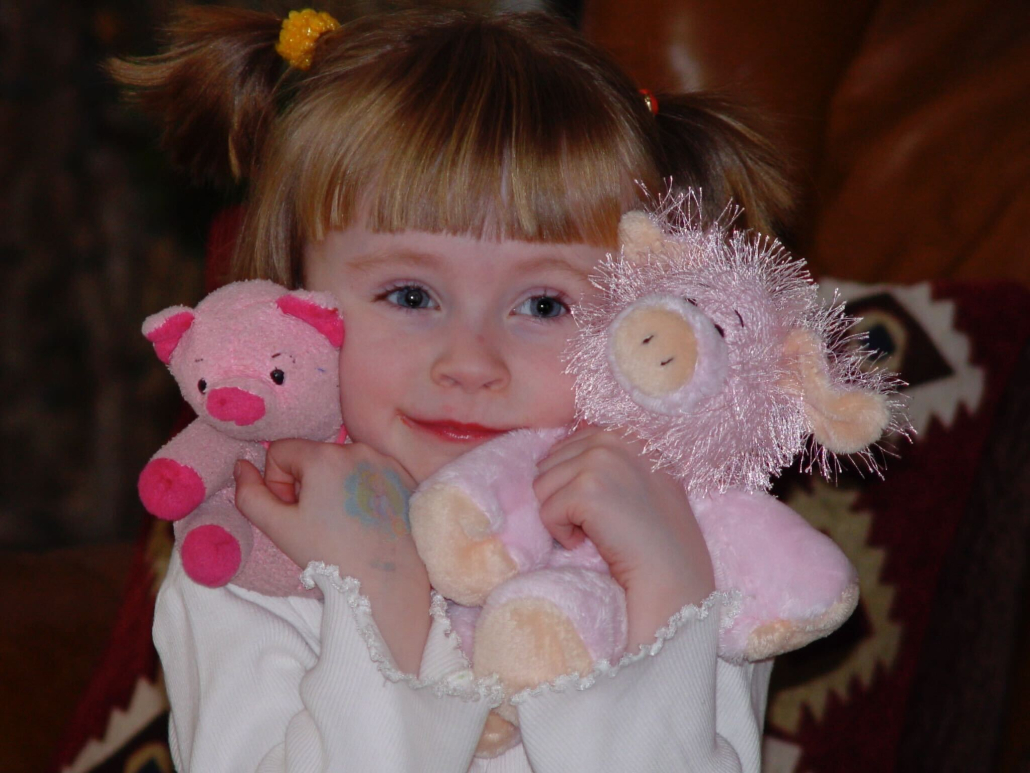Sometimes it can be healing to let yourself look at the world with childlike wonder and embrace the silly things.
This article contains discussions of sexual assault and mental health.
If you see me out and about, you will probably see a little, worn-out pink-stuffed pig coming everywhere with me. And I don’t take him everywhere just because I’m emotionally stunted from never being allowed to have a pet; for me, stuffed animals are one of the keys to my mental health.
I got my first pig stuffed animal when I was four — who, in a stroke of ingenuity, I named Piggy — as a Christmas gift from my grandmother. I carried him with me everywhere for years, up until I lost it on a trip with my family. I was devastated — Piggy was my best friend and my constant companion.
But my parents got me an identical new one, Wiggy, and I eventually grew to love him just the same. I even had a mini second pig, Arnold, gifted to me by my grandmother, to keep him company. These two pigs were my childhood best friends, and Arnold even had a keychain attached to him that I would clip to my belt loop to carry him around.
When middle school rolled around, I began to think that stuffed animals were for little kids. I was annoyed with the constant pig-themed gifts from my family and wrapped up in the notion that everyone around me was “growing up,” so I should, too. I wanted to prove that I was an adult, as middle schoolers do. So I abandoned them.
I maintained this attitude of superiority until I couldn’t anymore: I was sexually assaulted at the end of my sophomore year, and suddenly, all I wanted was to have the comfort of my childhood stuffed animals. I was experiencing intense anxiety and depression and hadn’t told a soul what happened to me — except Wiggy and Arnold.
They became an anchor for me, helping me to calm down when I started panicking and to ground me in school when I saw my perpetrator. When I needed to talk to someone but couldn’t because no one knew about the assault, I buried my head in the pigs and felt a little less alone.
That’s when I started taking Arnold everywhere with me again, taking photos of him à la Flat Stanley. My sister traveled to South Korea for two weeks, and I let her take Arnold with her to experience the trip. She sent me a few cute photos; I was hooked.
I have had to learn to be kind and compassionate to myself and to let go of my preconceived notions of what makes an adult.
Later that summer, my family went on a trip to Greece for my sister’s graduation and my parents’ 20th anniversary — it was the same trip they took on their honeymoon — and I took photos of Arnold everywhere.
He sat atop ancient ruins and posed at scenic vistas, becoming my digital scrapbook from the trip. When I got home and showed my friends the pictures, they suggested I make an Instagram for the pigs. I was hesitant at first — those middle school fears of being childish reared their ugly heads again — but the excitement and support from my field hockey team convinced me.
On September 2, 2018, I made my first post to @smol_piggy of Arnold introducing himself to the world. The next few days, I chronicled his time at the Made in America music festival, and the page was off to the races.
My friends on the field hockey team were elated that I finally caved and made the Instagram and immediately commented on all the photos. It was the first time I felt supported in my silly obsession with stuffed pigs, and I felt accepted in a way I never had before.
When the season started that school year, I brought the pigs to every practice, taking pictures and making them our little mascots. Suddenly all the girls on the team wanted a pig, so my mom ordered 40 from eBay for them and any other friends who wanted to join in on the pig stuffie fun.
Over the next school year, my mom saw how excited I was to be spreading the love and decided to get me a new pig of my own, the one whom I take everywhere with me today: Simon. He has officially taken over the Instagram account and is, unabashedly, my favorite. He has been one of the strongest supports in my life as I navigated my mental health these past few years; I like to think he even had a hand (hoof) in helping me get into USC with a scholarship.
I wrote an essay for the scholarship application about my time as the captain of the field hockey team, specifically about the pigs’ impact on my leadership and our team bonding. To my delight, my interviewers asked how Simon and Arnold were fairing these days.
I reached into my backpack and took out Simon, who was wearing a little USC t-shirt for the occasion. The interviewers laughed and asked me where I got him the shirt.
“I convinced my dad to buy a $30 teddy bear from the bookstore just for the shirt,” I admitted to them.
“You must really want to go here,” one of them responded.
I really did. And the rest is history.
Trending Posts

People tend to think my love for Simon is annoying or weird until they get to know me. Then they realize that to me, he is a stress ball, emotional support animal and childhood memento all rolled into one cute package.
When my grandmother passed away my sophomore year, he became a piece of her, too: a shoulder to cry on and a listening ear. I wish everyone had something like him, because Simon has taught me to embrace my inner child like nothing else.
If you haven’t heard of an inner child before, you aren’t alone — until recently, neither had I. The psychologist Carl Jung is credited with initially coining the phrase, to describe a supposed part of the subconscious that remains a younger version of yourself. The experiences you have as a child — including traumatizing ones, such as abuse, abandonment or neglect — therefore affect your decisions, desires and experiences long into adulthood. Research has also repeatedly suggested this to be true.
When I was assaulted at 15, I believed that it was somehow my fault. For almost a year, I denied what had happened and hid the truth from everyone, even my closest friends. That same year, my mom got me Simon because I suddenly was expressing an interest in my childhood toys: They were comforting to me in a way that nothing else could.
“We know that the past can play a role in the present,” Dr. Kelly Greco, a psychologist at Counseling and Mental Health and embedded counselor at the Annenberg School for Communication and Journalism, told me. “When we access the inner child, it’s the unresolved issues or experiences that can be resolved but also happy. So I can pull joyful moments of when I was a child, but as well as things where my needs may not have been met, or it may not have been my proudest moment.”
For me, reaching my inner child through the stuffed animals helped me to remember how joyful and simple things once were and to remind me that I could find those simple joys once again.
“Being playful doesn’t happen enough as an adult,” Greco told me. “As we get older and have these learned experiences and have to have more responsibility, we become also really critical of ourselves.”
Being childish does not have to be a bad thing. Sometimes it can be healing to let yourself look at the world with childlike wonder and embrace the silly things — like making my stuffed pig talk to my mom to get through the boredom of quarantine.
“When we’re with children, whether we’re an aunt or sibling or parent, we have that permission to be a child, but we need to give ourselves that permission without feeling like it’s [not] okay,” Greco said.
I have had to learn to be kind and compassionate to myself and to let go of my preconceived notions of what makes an adult. When I feel like all I want to do is curl up with Simon for a little while, I just do. I do what I need to stay sane, even if that is playing with stuffed animals, because my mental health is what’s really important.

A 2018 study found that 43% of adults admitted to still having regular contact with a stuffed animal. Clearly, it’s not as weird as everyone keeps telling me it is. And — perhaps most surprisingly — the study found men to be more attached to stuffies than women, with 84% of men having at least one stuffed animal as compared to 77% of women.
“We all need [to feel safe and secure],” Greco told me. “There’s so much that comes up on a daily basis or weekly or yearly that shakes us up and we don’t feel as in control and so I think that really helps ground us.”
So don’t feel obligated to leave those “childish” toys behind when you enter college or even leave it, and don’t let preconceived notions of masculinity stop you either. I plan on keeping Simon for the rest of my life simply because he makes me happy, and I don’t care what anyone thinks about it.
Not only is it more common than people think, but it also has many researched health benefits. Studies suggest that touching an inanimate object, like a stuffed animal, helps to combat anxiety and existential loneliness in adults as well as children.
The Association for Psychological Science published a study which suggests that “touch could be a useful supplement to more traditional cognitive-based therapies in treating low self-esteem and related disorders, such as depression and anxiety.”
Additionally, these studies show that sleeping with a stuffed animal can particularly help with anxiety and its related insomnia issues. The associated comfort of childhood sleep rituals can be a huge relief and support for many adults, especially for survivors of trauma like myself.
“Whenever we’re activated or triggered, we need to ground ourselves,” Greco told me. “And most of the time, it’s grounding ourselves in the present moment because our body, in terms of our mind and our emotions and physiologically — like my heart rate going up — is reacting to the past.”
It doesn’t have to be a stuffed animal, Greco said: A pillow, a blanket, a childhood memento, a song or even a photo can be an instrument of self-soothing for adults. It just happens to be an adorable stuffed pig that helps me to calm trauma responses when I am triggered and to provide general comfort.
It’s not weird or silly to still love your stuffed animals even as an adult. I still love mine and many other adults do too. Don’t give up on something that comforts you just because of how others may view you. I will never apologize again for treasuring my stuffed pigs because they help me with my mental health, and that is more important than anyone else’s opinion about how childish I am. ❋
Kate McQuarrie is the opinion editor at the Daily Trojan. She is a rising senior majoring in English literature.











